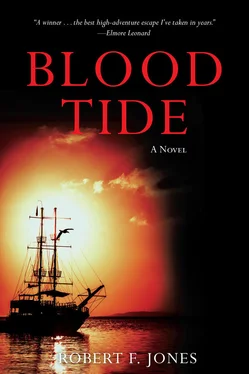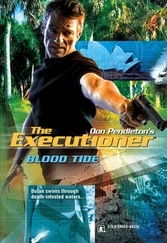Robert Jones - Blood Tide
Здесь есть возможность читать онлайн «Robert Jones - Blood Tide» весь текст электронной книги совершенно бесплатно (целиком полную версию без сокращений). В некоторых случаях можно слушать аудио, скачать через торрент в формате fb2 и присутствует краткое содержание. Год выпуска: 2014, Жанр: Старинная литература, на английском языке. Описание произведения, (предисловие) а так же отзывы посетителей доступны на портале библиотеки ЛибКат.
- Название:Blood Tide
- Автор:
- Жанр:
- Год:2014
- ISBN:нет данных
- Рейтинг книги:5 / 5. Голосов: 1
-
Избранное:Добавить в избранное
- Отзывы:
-
Ваша оценка:
- 100
- 1
- 2
- 3
- 4
- 5
Blood Tide: краткое содержание, описание и аннотация
Предлагаем к чтению аннотацию, описание, краткое содержание или предисловие (зависит от того, что написал сам автор книги «Blood Tide»). Если вы не нашли необходимую информацию о книге — напишите в комментариях, мы постараемся отыскать её.
Blood Tide — читать онлайн бесплатно полную книгу (весь текст) целиком
Ниже представлен текст книги, разбитый по страницам. Система сохранения места последней прочитанной страницы, позволяет с удобством читать онлайн бесплатно книгу «Blood Tide», без необходимости каждый раз заново искать на чём Вы остановились. Поставьте закладку, и сможете в любой момент перейти на страницу, на которой закончили чтение.
Интервал:
Закладка:
But then, with a stroke of fortune that could only be God’s hand at work, Effredio Pascal had received a letter from some American girl. By happy chance—again, God’s hand?—Padre Cotinho was on Siquijor—hiding from government salvage squads—when Pascal got the letter. Pascal of course turned to his old confessor for advice. Padre Cotinho saw the whole plan clicking into place: PHILIPPINE FREEDOM FIGHTERS AID AMERICAN GIRL IN REDRESSING GRIEVANCE AGAINST U.S. NAVY PIRATES. And not just the good-looking, clean-cut young American woman, but her war-hero father as well—a navy man who’d been injustly ousted from the service he loved and served with total loyalty, and who now was prepared to take vengeance on that same navy for crimes committed against his helpless daughter. . . . It was perfect. Even the leadership had, finally, to agree.
But they still had their doubts about Katana. So did Padre Cotinho, for that matter. A former officer of the Imperial Japanese Navy. Elderly (though he didn’t look it), and perhaps slightly loco. Perhaps, even worse, with links to Japanese organized crime. Tough-looking Japanese men accompanied him everywhere he went in the Flyaways. Yakuza? The Japanese equivalent of the Mafia? Perhaps the yakuza , quite understandably, planned to take over the operation once Millikan was destroyed. So Padre Cotinho would see to it that not a single Japanese, Katana included, survived the forthcoming battle.
But certainly Katana had a keen tactical mind. He understood ships and weapons far better than Padre Cotinho could ever hope to, far better than the revolutionary leaders could—that was certain. And even if Katana’s battle plan failed—which it well might: Katana intended, after all, to divide his forces, and even Padre Cotinho had read enough Clausewitz to know that that was the route to disaster—even if the plan failed, there would be survivors enough, with photographs. It might even be better that way. BRAVE AMERICAN GIRL AND WAR-HERO FATHER DIE AT HANDS OF U.S. NAVY IMPERIALIST PIRATES. DESPITE AID OF FILIPINO FREEDOM FIGHTERS, RESCUE OPERATION FAILS. In a play on the phrase he had heard many Americans use, Padre Cotinho knew he couldn’t lose for losing. He finished his drink—it had grown warm now, even in the shade—and rose from his chair. A short, lean, bearded man with a thick shock of white hair that still grew low on his forehead, Cotinho looked almost military in his long black soutane. The scars of many beatings crisscrossed his hard, brown face. Padre Fagundes, watching from the window of his study in the low, stucco-walled, red-roofed rectory, studied his friend’s gait as he approached the house. Steady, erect, straight-backed, firm of tread despite his seventy years and that blasphemous breakfast of assassin’s rum—like Saint Ignatius of Loyola himself must have walked, nearly half a millennium ago, before he was wounded and found God—and the Society of Jesus—in the blood of his wound. A soldier. Ah, but the cause?
Kasim woke them shortly before sunrise. Their rooms in the officers’ quarters were spartan but clean and airy, with mosquito-proof screens on the windows. Miranda had slept well on the tatami mat and futon, enjoying the cool night breeze and the imagined sway of the land after weeks at sea. Japanese scrolls ornamented the walls of her room—scenes of samurai and doleful ladies, of Fuji and rearing blue seas. A portrait of Hirohito, looking incredibly young and garbed in full imperial robes, hung faded on one bulkhead. Chrysanthemum blossoms, floating in a bowl of water, graced the air with their delicate perfume. Kasim brought with him bowls of strong tea and a wicker platter on which rested a black, flower-patterned lacquer bowl of steaming hot water and rolled, hot towels. He told them, smiling as always, that the capitán awaited their pleasure in his oficina .
“Now then,” Sôbô said when they had mustered. “Down to business. Captain Miranda, Kasim, and Mr. Pascal to their scouting mission. Bosun, you and I will be off shortly to the islands of Moro Armado and Balbal on work of our own. It will give us a chance to recall old times, tell a few sea stories, no doubt, and allow you to see the scope of these islands. Later, when we return, you may advise your companions about what you have learned. By the way, lunches and beverages have been prepared for all of us, and await us in our respective boats. Now, let’s be having you.”
“I thought Moro Armado was the name of Millikan’s gunboat,” Culdee said.
“Yes,” Sôbô answered. “That class of gunboats was named for various Philippine islands. His is named for the island of Moro Armado, right here in the Flyaways. You’ll see it shortly. It’s a prison island, political prisoners mostly—anyone who doesn’t agree with the commodore’s policies ends up there. It sometimes provides victims for San Lázaro’s Good Friday crucifixions as well. Quaint custom, what? Tomorrow is Good Friday. But I’m afraid we’ll be too busy to attend. Now let’s be up and doing, shall we?”
Sôbô led them out a back exit from the bunker complex and across thorn-walled trails to the lee side of the island. Two pump boats lay beached on the white sand, their big Yamaha engines tilted up at the stern. At Sôbô’s suggestion, Miranda hid behind the thorn scrub and replaced her work shirt and cap with an oversized yellow T-shirt and a bleached-out blue bandanna. “You’re tall and dark enough to pass for a Moro,” he told her. “This will complete the disguise.” With the bandanna wrapped and knotted pirate-fashion around her pinned-up hair, she did indeed look like a mundo , Culdee thought. Especially with those green eyes and that hawklike profile. And with her arms folded across her chest.
“We go,” Kasim said. Efreddio and Miranda pushed off, Kasim started the engine with one pull of the cord, and they were on their way.
Sôbô and Culdee headed out soon after.
The two men beached the pump boat in the near lee of Moro Armado. In the distance Culdee could see the blinding shimmer of salt pans exploding with mirages even in the low sun of morning. Huge, gaunt figures, warping in the wind, stalked the flats, then shrank instantly, becoming squat, black antlike dots. The growl of truck engines and dredges reached them through the wind. “Prisoners,” Sôbô explained. “Mining salt. Those kennellike structures over there”—he pointed to some low, crusty-roofed lumps on the edge of the pans—“that’s where they’re housed. I think they market the salt in Zamboanga and Puerto Princesa, but of course it’s just part of Millikan’s shipping-enterprise cover. Those are the guard towers.” He pointed to some tall, skeletal gantries that encircled the salt pans. “M60 machine guns, I’m told. Barbed wire around the whole place. Ah, here comes our man.”
A jeep bounced over the salt slabs, squealed to a rusty-drummed halt, and extruded the tallest Arab Culdee had ever seen. He was clad in white from head to foot—turban, long flapping robes, even a pair of white sandals with turned-up toes. His face looked black by contrast, and, as he approached them, storklike in his stride, Culdee saw that he had one eye missing, with a white patch covering the hole.
“This is Balabatchi,” Sôbô said, introducing them. “The One-Eyed Crocodile, some call him, hey, old man?” He clapped Balabat-chi’s bony shoulder, and the Arab smiled brilliantly. “Nominally, he’s the island’s sailmaker and foreman of the boat-repair yard at Narr Lagoon. In fact, he is superintendent of the guard force here. And he’s with us. Now, old son”—Sôbô turned to Culdee and bowed apologetically—“if you’ll excuse us for a few moments, Bala and I have some details to iron out. To ‘finalize,’ as you Yanks so delightfully put it.”
Читать дальшеИнтервал:
Закладка:
Похожие книги на «Blood Tide»
Представляем Вашему вниманию похожие книги на «Blood Tide» списком для выбора. Мы отобрали схожую по названию и смыслу литературу в надежде предоставить читателям больше вариантов отыскать новые, интересные, ещё непрочитанные произведения.
Обсуждение, отзывы о книге «Blood Tide» и просто собственные мнения читателей. Оставьте ваши комментарии, напишите, что Вы думаете о произведении, его смысле или главных героях. Укажите что конкретно понравилось, а что нет, и почему Вы так считаете.












